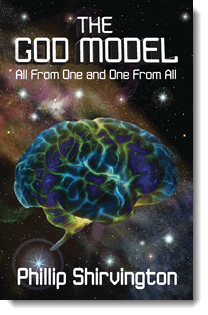The God Model: All From One and One From All
by Phillip Shirvington

Review Copy Request
Categories
- Religion & spirituality > religious studies & references > comparative religion
- Religion & spirituality > religious studies & references > psychology
- Religion & spirituality > religious studies and references > science & religion
- Religion & spirituality > religious studies and references > history
Keywords
- Religion
- God
- Mind
- Theology
- Christianity
- Evolution
- Atheism
- History
- Psychology
Other titles in this genre
- The God Gene: How Faith Is Hardwired into Our Genes
- The Varieties of Religious Experience: A Study in Human Nature
- The Varieties of Religious Experience
- Why God Won't Go Away
- The World's Religions
- The Faith Instinct
- The God Delusion
Review
A short but densely packed attempt to construct a sort of unified theory of God. In a literate, multifaceted overview, Shirvington takes readers through the basic psychological allure of religion and the ways that humans have responded to it over the millennia. But his goal is ultimately investigative, not historical: he wishes to uncover the root cause of religiosity – why so many humans throughout history have been interested in “blurring the boundaries of the limited self” in order to seek a higher power. He locates this urge in human DNA and the human brain. ~ Kirkus Reviews
Description
In recent surveys in the United States 90% of respondents reported that they believed in God. This is despite a lack of hard evidence for His existence: faith is enough. Over millennia, belief in spirits or gods has been almost universal, and this has given rise to a kaleidoscopic offering of religions, each with its own God Model. Phillip Shirvington takes you on a search for the common root, if any, in this diversity. Is this religiosity due to indoctrination of children into religion; or is it hard-wired into our brains and DNA; or is God everywhere apparent? Of Christians, some 75% report religious experiences within their minds which they interpret as the presence of God. Persons who have not received religious training do not report these experiences, although some may describe experiences of a spiritual kind. Whatever its theology, religion universally involves expanding the limited bounds of the self to experience the wider sphere of human existence, and even God. There is recent scientific evidence that religiosity is innate, like language, but the specifics of its expression are determined by the cultural environment, also like language. Yet, if religiosity has a biological origin, how did it arise during evolution and how come just over 25% of people do not have religious experiences, including all Atheists? One explanation is that religiosity is a cultural meme that has been passed down by word of mouth through successive generations over the past 100,000 years or so, and has conferred some social advantage leading to its retention. Yet there are also compelling arguments for religiosity to have evolved biologically during this same period, when inter-tribal war was rife, and where the incentive of an afterlife may have lessened the fear of death in battle and thus had some adaptive advantage for natural selection. The author takes you through an examination of the arguments for and against these positions.